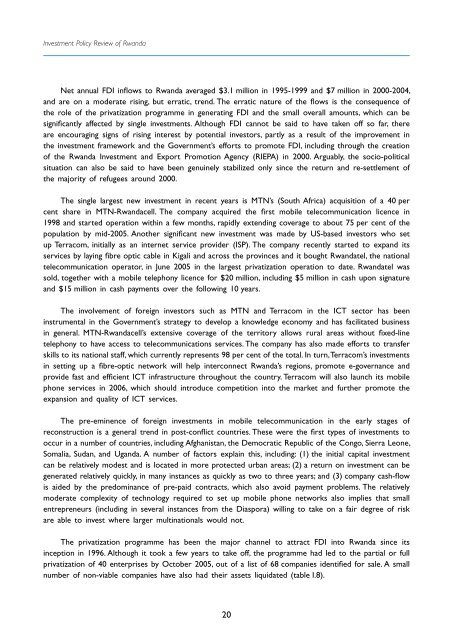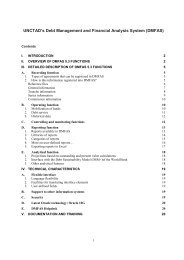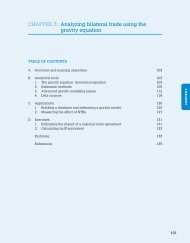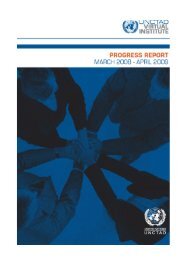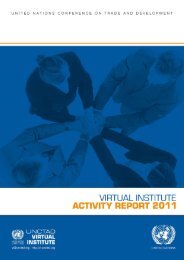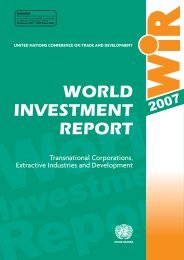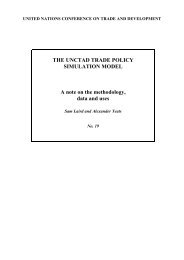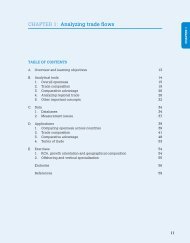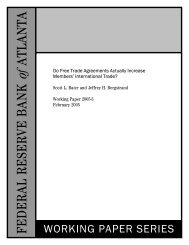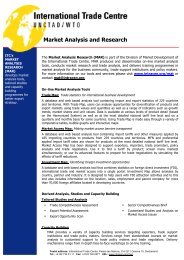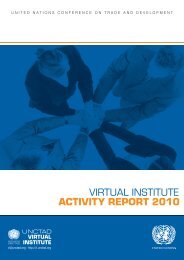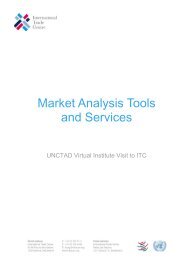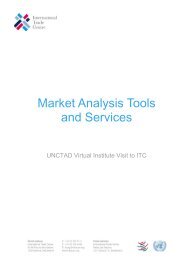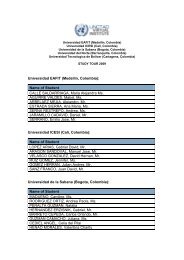Investment Policy Review - Rwanda - UNCTAD Virtual Institute
Investment Policy Review - Rwanda - UNCTAD Virtual Institute
Investment Policy Review - Rwanda - UNCTAD Virtual Institute
Create successful ePaper yourself
Turn your PDF publications into a flip-book with our unique Google optimized e-Paper software.
<strong>Investment</strong> <strong>Policy</strong> <strong>Review</strong> of <strong>Rwanda</strong><br />
Net annual FDI inflows to <strong>Rwanda</strong> averaged $3.1 million in 1995-1999 and $7 million in 2000-2004,<br />
and are on a moderate rising, but erratic, trend. The erratic nature of the flows is the consequence of<br />
the role of the privatization programme in generating FDI and the small overall amounts, which can be<br />
significantly affected by single investments. Although FDI cannot be said to have taken off so far, there<br />
are encouraging signs of rising interest by potential investors, partly as a result of the improvement in<br />
the investment framework and the Government’s efforts to promote FDI, including through the creation<br />
of the <strong>Rwanda</strong> <strong>Investment</strong> and Export Promotion Agency (RIEPA) in 2000. Arguably, the socio-political<br />
situation can also be said to have been genuinely stabilized only since the return and re-settlement of<br />
the majority of refugees around 2000.<br />
The single largest new investment in recent years is MTN’s (South Africa) acquisition of a 40 per<br />
cent share in MTN-<strong>Rwanda</strong>cell. The company acquired the first mobile telecommunication licence in<br />
1998 and started operation within a few months, rapidly extending coverage to about 75 per cent of the<br />
population by mid-2005. Another significant new investment was made by US-based investors who set<br />
up Terracom, initially as an internet service provider (ISP). The company recently started to expand its<br />
services by laying fibre optic cable in Kigali and across the provinces and it bought <strong>Rwanda</strong>tel, the national<br />
telecommunication operator, in June 2005 in the largest privatization operation to date. <strong>Rwanda</strong>tel was<br />
sold, together with a mobile telephony licence for $20 million, including $5 million in cash upon signature<br />
and $15 million in cash payments over the following 10 years.<br />
The involvement of foreign investors such as MTN and Terracom in the ICT sector has been<br />
instrumental in the Government’s strategy to develop a knowledge economy and has facilitated business<br />
in general. MTN-<strong>Rwanda</strong>cell’s extensive coverage of the territory allows rural areas without fixed-line<br />
telephony to have access to telecommunications services. The company has also made efforts to transfer<br />
skills to its national staff, which currently represents 98 per cent of the total. In turn, Terracom’s investments<br />
in setting up a fibre-optic network will help interconnect <strong>Rwanda</strong>’s regions, promote e-governance and<br />
provide fast and efficient ICT infrastructure throughout the country. Terracom will also launch its mobile<br />
phone services in 2006, which should introduce competition into the market and further promote the<br />
expansion and quality of ICT services.<br />
The pre-eminence of foreign investments in mobile telecommunication in the early stages of<br />
reconstruction is a general trend in post-conflict countries. These were the first types of investments to<br />
occur in a number of countries, including Afghanistan, the Democratic Republic of the Congo, Sierra Leone,<br />
Somalia, Sudan, and Uganda. A number of factors explain this, including: (1) the initial capital investment<br />
can be relatively modest and is located in more protected urban areas; (2) a return on investment can be<br />
generated relatively quickly, in many instances as quickly as two to three years; and (3) company cash-flow<br />
is aided by the predominance of pre-paid contracts, which also avoid payment problems. The relatively<br />
moderate complexity of technology required to set up mobile phone networks also implies that small<br />
entrepreneurs (including in several instances from the Diaspora) willing to take on a fair degree of risk<br />
are able to invest where larger multinationals would not.<br />
The privatization programme has been the major channel to attract FDI into <strong>Rwanda</strong> since its<br />
inception in 1996. Although it took a few years to take off, the programme had led to the partial or full<br />
privatization of 40 enterprises by October 2005, out of a list of 68 companies identified for sale. A small<br />
number of non-viable companies have also had their assets liquidated (table I.8).<br />
20


